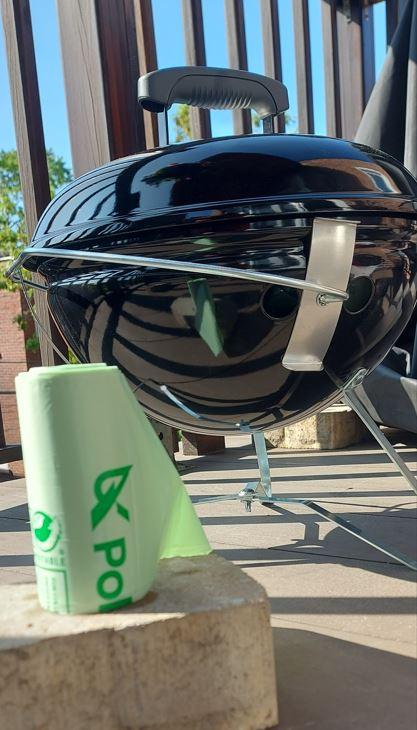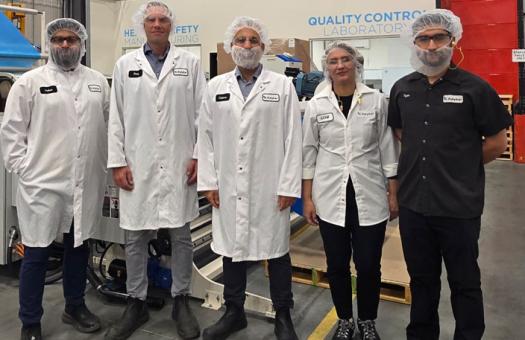10/06/2024
More composting = less waste

Start your sustainable journey with Polykar's certified compostable bags.
As summer approaches, we can all start to feel that renewed enthusiasm for warm weather and outdoor activities including timeless barbecuing traditions, picnics, camping, you name it.
And if you've been wanting to up your environmental game, then composting should definitely make it onto your to-do list. In fact, this is one of the easiest and most effective ways to reduce your carbon footprint, while also benefiting the environment. Not sure where or how to start? Don't worry –– Polykar has all the ins and outs of composting during these summer months right here in this blog post.
What are compostable bags and how do they work?
It's important to note that compostable bags should only be used for their intended purpose, such as collecting food scraps or yard waste for composting. These bags are designed to break down naturally in composting facilities. Through the process of biodegradation, compostable bags decompose into smaller pieces and release nutrients into the soil, supporting plant growth. However, proper disposal is crucial as these bags require specific conditions to break down effectively. They should not be used for general garbage disposal, as they will not break down in a landfill. Picking the right bag is key for you and your local composter. Let's make sure we get it right!
What should you place into your compostable bags:
To ensure that your compostable bags are effectively turned into nutrient-rich soil, it is crucial to know which items to include. Organic waste is the primary component of composting, such as fruit and vegetable scraps, coffee grounds, and eggshells. Yard waste like grass clippings and leaves can also be included. Remember, the success of your composting efforts depends on what you put inside your compostable bags.
*See how they stack up — bag to bag*
How do I know if the bag is truly compostable?
When it comes to compostable products, the Biodegradable Plastics Institute (BPI) certification is what you want to look for. It's an international label that assures you that the product has been tested in a lab and will break down quickly in a composting facility and without leaving any harmful residues.
At Polykar, we're proud to offer compostable bags that are certified by BPI, the Bureau de normalisation du Québec (BNQ), and meet the standards of the American Society for Testing and Materials (ASTM D6400). In addition, our bags hold UL 126 Environment’s ECOLOGO® certification, so you know you're making a sustainable choice.
*Click here to view our Polykar infographic*
Selecting the right type of compostable bag for your needs
Choosing the right type of sustainable compostable bag is important to ensure that it meets your needs and can be properly composted. There are a few things to consider when selecting a compostable bag, such as the size, material, and intended use.
Size: Consider the amount of waste you generate and the frequency of disposal when selecting the appropriate size. Polykar’s certified compostable bags come in various sizes, from small bin liners for food scrap to larger yard waste bags. They also come in a tinted green colour and are conveniently available on a compact perforated roll for easy dispensing.
Material: Compostable bags are made from a variety of materials, such as cornstarch, sugarcane, and potato starch. Some bags may also contain a percentage of petroleum-based materials, so check the label to ensure the bag is 100% compostable.
Intended use: Consider what you will use the bag for and choose the appropriate thickness and strength. For example, a small bin liner may not need to be as thick as a larger yard waste bag. That is why Polykar’s bags are offered in a variety of sizes and thicknesses range from 0.7 to 1 Mil.
By selecting the right type of compostable bag for your needs, you can ensure that it can be properly composted and reduce waste for a more sustainable future.
The importance of proper disposal when using compostable bags
To ensure that compostable bags are disposed of properly, it's important to check with your local waste management service to see if they accept these bags in their composting program. By properly disposing of organic waste in compostable bags, we can help reduce waste and support sustainable practices for a healthier planet.
For example, if you are in Québec, here is a map of residential collection of food and green waste and composting sites (existing or planned) from Recyc-Québec.
Another useful link can be found via the Compost Council of Canada. Click on their map.
Polykar for a greener tomorrow
Composting is a valuable practice to reduce waste and make use of organic materials that otherwise would clog up landfills. You'll be doing your part to reduce waste and help create a more eco-friendly environment. Plus, it'll feel good knowing that you're contributing to something positive! With the tips and knowledge shared in this blog post, you're well on your way to becoming a composting pro.
Choose Polykar for all of your compostable needs and experience the difference today!
More News

Polykar Chooses FARMOR Architecture and Dawson Wallace for Edmonton Expansion
Polykar Chooses FARMOR Architecture and Dawson Wallace for Edmonton Expansion
Read more
Polykar Invests $20 Million to Double its Capacity in Edmonton
Polykar Invests $20 Million to Double its Capacity in Edmonton
Read more
Polykar EDM Recognized Among Canada’s Elite with Top BRCGS Rating
Polykar EDM Recognized Among Canada’s Elite with Top BRCGS Rating
Read more